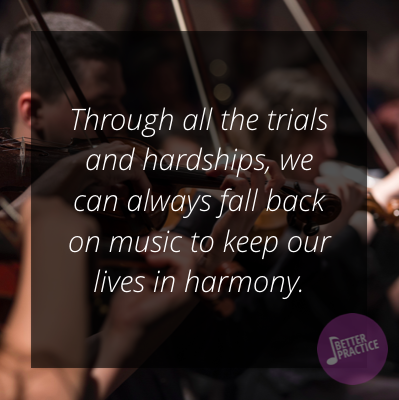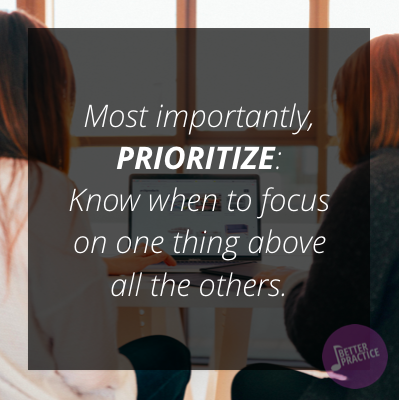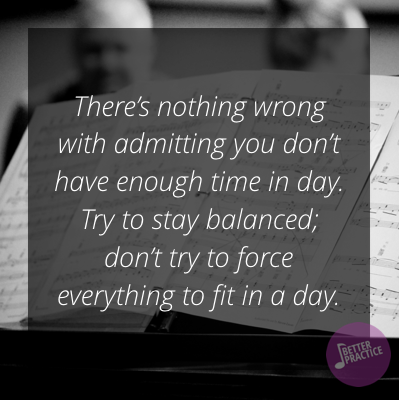It’s no secret – students today lead far more hectic lives than they did twenty or even ten years ago. More and more teenage students find themselves struggling to balance their schedules. There have always been academic pressures and extracurricular activities, but in recent years, the amount that each student has to accomplish in a day just to stay caught up is staggering. So how do you as a student balance your incredibly packed schedule and still make time for music practice? Well, it’s not as impossible as you might think!
For me, it was once I entered high school that my schedule became much more chaotic. I juggled being a full time member of my high school band, taking several AP and Honors classes, studying for the SAT, teaching private music lessons, taking music lessons of my own, volunteering, participating in sports year-round, working gigs, and trying to maintain some small semblance of a social life throughout it all. (And, I had to keep up with my favorite TV shows because, you know, no Netflix.) So how on earth do you make time for practicing music when things are this busy? The most important thing is prioritization. Not necessarily balancing the time I devoted to all of these activities (though that is important and we’ll talk about that soon), but knowing when I needed to focus on one thing beyond all the others.

1. Use music as an escape
Sometimes it’s just too overwhelming to sit at your desk and do homework for six straight hours. Nobody can do that for more than a few days before they just start to burn out. As students of music, there was a reason we chose to pursue this art form as we got older, and probably a big part of that was because it’s fun. Sure, not everything you practice is fun, (sometimes it can be the most challenging thing you do in a day!), but at its core, music is something we pursue because we genuinely enjoy it. So why not let that music make a hectic day calmer for half an hour? If you’re drowning in piles of homework that have you so frustrated you just want to throw it all down and give up (or rip it in half out of frustration like…someone I knew once did), take some time to just play. Remind yourself why music is fun while letting it relax you and bring some joy into an otherwise stifling evening. After you do that, you’ll find yourself refreshed and ready to tackle the rest of your evening with renewed enthusiasm – and you got some practice in!
2. Blocking your Schedule
Scheduling your time is a must. The world’s most successful people (Elon Musk, to name one, although I wouldn’t recommend his 120 hour work weeks) often have their days scheduled down to the minute. If you feel overwhelmed and you haven’t tried blocking your schedule yet, do it now!
To start, try planning out tomorrow’s after-school schedule. Have a list of everything you need to do handy, and prioritize what needs to be done tomorrow (for example, an assignment or test that’s the day after). Then see what less-immediate things you can fit in for the rest of the day. Whatever you haven’t put in yet, schedule to do first the next day. If you can, try to put a small block in for practice every day. If you can only fit 15 minutes, that’s better than nothing, but have some days where you make practice the priority. You can even schedule a block of leisure time, and include playing music for fun in that time. It’s important to realize that sometimes we all need a break. If you always keep going as hard as you possibly can, you’ll burn out very quickly. I would too. So would everyone else. With a blocked schedule, it’s easier to make time for practice and leisure (and everything else you need to do)!

3. Plan Practice
Even within your personal music practice, there are ways to organize and schedule your time so practice is more efficient and effective. Look at Better Practice’s smart learning AI – it can organize assignments based on how well you did with them before. That way you don’t even have to spend time thinking of what to work on – you can just get right to it. Laying out a timetable for yourself is a good way to establish goals as well. If I wanted to be able to play a piece by the end of October, I could break it down into sections and focus on one or two a week until I had worked my way through the entire piece. I can even take it a step further and input those sections as individual assignments right into the app, that way they’re easy to work on and devote some time to. And that’s just the tip of the iceberg when it comes to more efficiently planning out your practice.

4. Prioritize
One final point I’d like to stress is that it’s okay to not fit everything into one day sometimes. I work with high schoolers in the music program daily and this time of year is incredibly busy for them. Sometimes they don’t get home from school until 9:00pm. And there’s nothing wrong with admitting you just don’t have time for everything on a day like that. The goal is to try to get through everything in a way that keeps your life in balance, not necessarily force everything to fit in a single day. There will be times when you just can’t do it all, and that’s okay! It doesn’t make you a failure or anything. It makes you a teenager in an increasingly demanding academic world. But through all the trials and hardships, we as musicians can always fall back on music to keep our lives in harmony. Just remember to let scheduling your time be a benefit to you, not a further hardship. Because when us musicians are able to comfortably set aside time for music, we find ourselves much happier and more able to get through anything the world throws at us!
> “Where’s the fire, what’s the hurry about? //
> You’d better cool it off before you burn it out //
> You’ve got so much to do //
> And only so many hours in a day”
- Vienna, Billy Joel